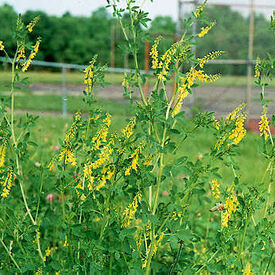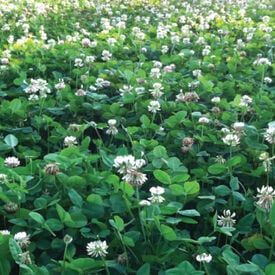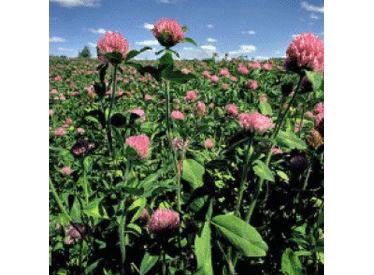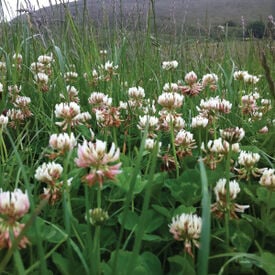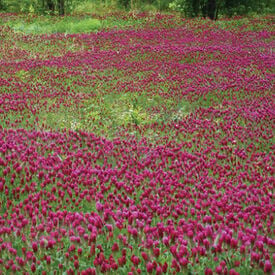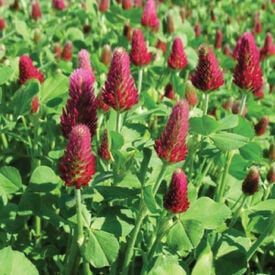The Sweet Clover is a legume that is exceptional for not only attracting honey bees to the garden, but also creating green manure! This clover can grow nearly anywhere under most conditions. The Sweet Clover is our favorite clover because it is more versatile than other clovers at nitrogen fixating, erosion control and attracting beneficial insects. This variety is slow to establish the first year but comes on fast the following year and can produce up to 170 lb. of nitrogen per acre. The Sweet Clover comes OMRI Pre-inoculated. Uses: Bees & Beneficial Insects, Chicken Forage, Compaction Control, Deer Attractant, Erosion Control, Forage, Green Manure, Nitrogen Fixation, No Till, Weed Suppression
The Ladino Clover is the most popular white clover in the USA as it is two to four times as large as the common white clover! This clover has a high nutritive value and is palatability, making it a popular choice in pasture mixtures. It is not deep rooted, and will not tolerate much drought. Ryegrass and orchardgrass work well with ladino clover in mixtures. Broadcast at 25 lbs. per acre. Seed comes inoculated. Uses: Bees & Beneficial Insects, Chicken Forage, Compaction Control, Deer Attractant, Erosion Control, Forage, Green Manure, Nitrogen Fixation, No Till, Weed Suppression
The Mammoth Red Clover is a large, fast growing clover that is an ideal grazing crop and can be sowed in spring, summer or fall! Mammoth Red is a popular biennial clover used for Nitrogen addition and hay crops. This red clover may be the best choice for frost seeding; it is extremely cold hardy and does well in most soils and growing conditions. The Mammoth Red Clover will fix up to 70-110 lbs. nitrogen per acre. This variety's long tap roots loosen soils and mine phosphorus and other nutrients from deep in the soil. Uses: Bees & Beneficial Insects, Chicken Forage, Compaction Control, Deer Attractant, Erosion Control, Forage, Green Manure, Nitrogen Fixation, No Till, Weed Suppression
The White Dutch Clover is a perennial clover variety that is a customer favorite for controlling erosion while protecting the soil! This legume is a living mulch of permanent cover that spreads by stolons. Grow low so takes close mowing and grazing. The White Dutch Clover benefits bees and insects as well as fixes nitrogen. Uses: Bees & Beneficial Insects, Chicken Forage, Deer Attractant, Erosion Control, Forage, Green Manure, Nitrogen Fixation, No Till, Weed Suppression
The Medium Red Clover is fast to establish and can be grown in most soil types as well as sowed in spring, summer or fall! This clover works well for hay or silage. The Medium Red Clover can be used as a cover crop between rows of vegetable crops if mowed to maintain manageability. This clover can fix up to 150 lb. of nitrogen per acre. Uses: Bees & Beneficial Insects, Chicken Forage, Compaction Control, Deer Attractant, Erosion Control, Forage, Green Manure, Nitrogen Fixation, No Till, Weed Suppression
The Crimson Clover is an attractive winter annual that can be planted fall or early spring and will protect and improve the soil. This good nitrogen fixer (70-150 lbs per acre per year) blooms showy crimson flowers in late spring that are an excellent source of nectar for bees. This variety inter-seeds well with grass, making it a great way to ready your vegetable garden for the spring or beautify a landscape! Not to be confused with the tough perennial clovers that can take over a meadow. Uses: Bees & Beneficial Insects, Chicken Forage, Compaction Control, Deer Attractant, Erosion Control, Forage, Green Manure, Nitrogen Fixation, No Till, Weed Suppression
